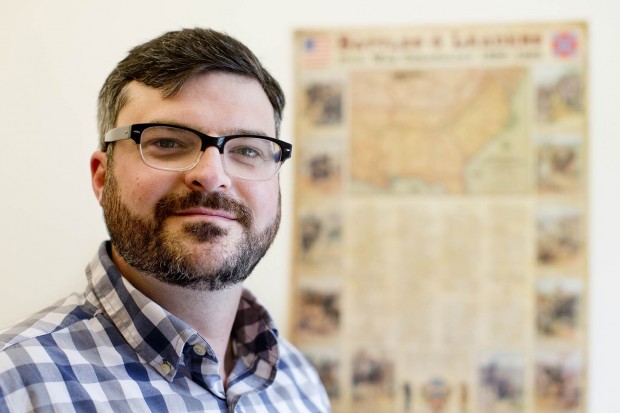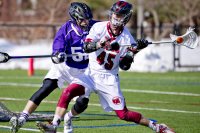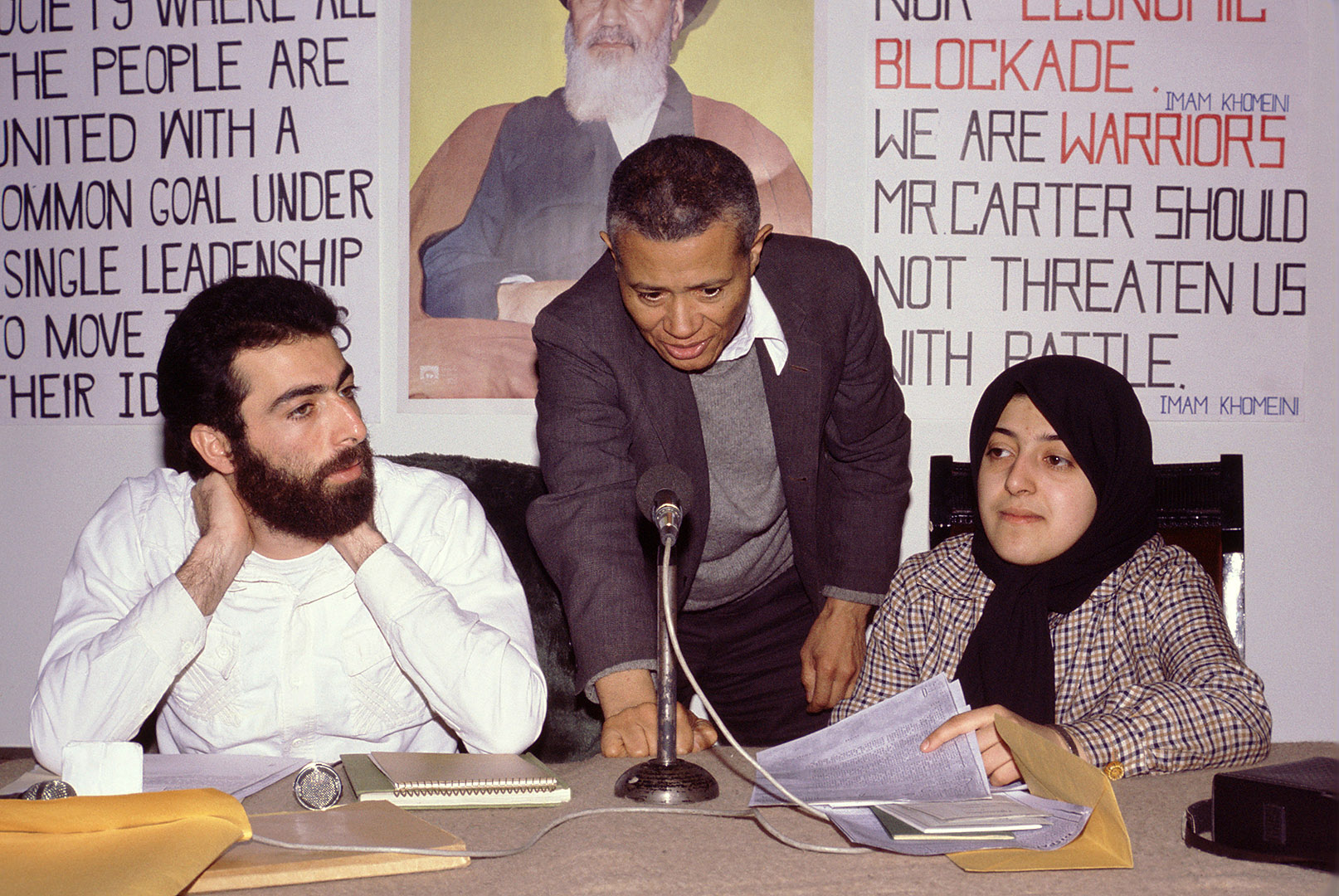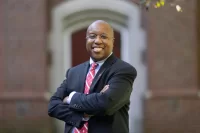
Michael Rocque
Megan Rapinoe did not stomp on the flag. Here’s why people got outraged regardless — Newsweek
In Newsweek, Associate Professor of Sociology Michael Rocque argued that a recent Twitter flareup — in which World Cup-winning soccer player Megan Rapinoe was accused of stomping on the American flag, when she’d done no such thing — is part of a pattern of often-uninformed outrage on social media.
“The temptation to jump to outrage is especially strong on social media, where our virtual communities of the like-minded, created by choosing our ‘friends’ and whom to follow, reinforce our preconceptions and can block any facts that get in their way,” Rocque wrote.
Anger spreads more easily online than other emotions, and collective anger paradoxically leads to feelings of affirmation and unity, Rocque wrote. “We’re wired to crave that collective anger.”
So before taking part in an online mob, he suggested, wait a second to get the facts.
“When we see a meme, post or tweet that sparks that familiar tingle of outrage, take a minute to look into it, verify sources or, better yet, wait to see how the story unfolds once more information is gathered.”
Read the story:
- “Megan Rapinoe did not stomp on the flag. Here’s why people got outraged regardless,” Newsweek, July 12, 2019
Joyce White Vance ’82
Prosecutors pick their battles. I chose not to pursue an ICE raid in Alabama — The Washington Post
Best-known these days for her legal insights into special counsel Robert Mueller’s investigation and report on the 2016 elections, Joyce White Vance ’82 recently turned her attention to the massive Immigration and Customs Enforcement raid of food processing plants in Mississippi.
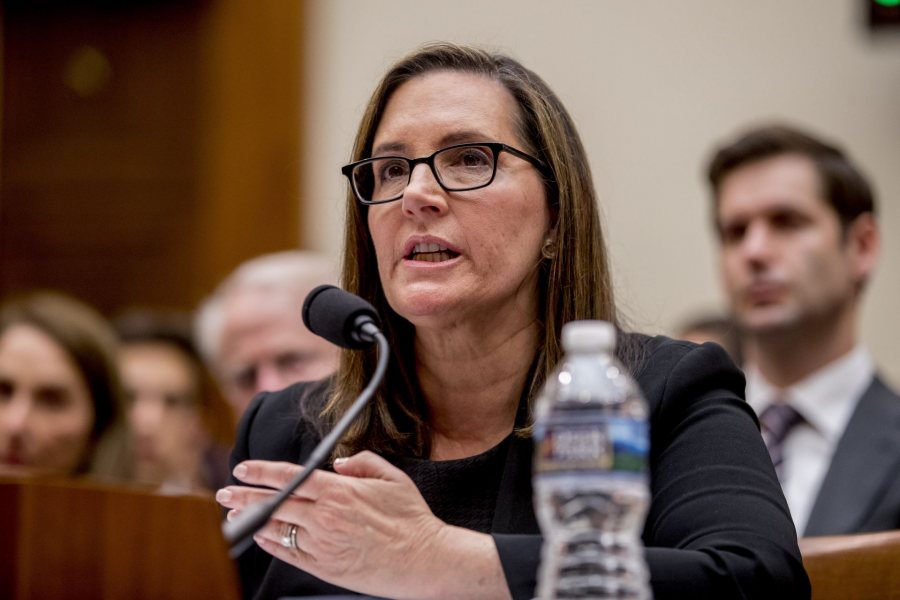
Former U.S. Attorney for the Northern District of Alabama Joyce White Vance ’82 speaks at a House Judiciary Committee hearing on the Mueller Report on Capitol Hill in June. (AP Photo/Andrew Harnik)
A former U.S. attorney for Alabama, Vance once declined to pursue an ICE raid in her state because she failed to “see how it would be a wise use of our resources to pull away from crimes that were affecting our community in visible ways to arrest people who, while they might have lacked legal immigration status, were going to work every day.”
Noting that it took months to plan the ICE raids, Vance wondered if there aren’t other prosecutions that might have “better served the community” than “removing parents from children — children that the parents were hard at work for, so they could help them grow into productive citizens.”
Read the story:
- “Prosecutors pick their battles. I chose not to pursue an ICE raid in Alabama,” The Washington Post, Aug. 9, 2019
Scott Allen ’84
These doctors risked their careers to expose the dangers children face in immigrant family detention — CNN
For years, Drs. Scott Allen and Pamela McPherson did their work — inspecting facilities where U.S. Immigration and Customs Enforcement detains immigrant families — quietly.
But in 2018, the two doctors, who are medical consultants for the Department of Homeland Security’s Office for Civil Rights and Civil Liberties, became whistleblowers.
Since then, Allen and McPherson have appeared in myriad media outlets, including The New York Times, 60 Minutes, and The Washington Post, to call attention to the harm children suffer when confined, with or without parents, to detention facilities, such as the ICE centers at the Southwest U.S. border.
“Each passing day of continued detention of children — and no acknowledgment of the risk that we have reported — alarms me,” Dr. Scott Allen ’84 told CNN in May.
“The medical community is quite unified in opposition to the detention of children. Decades of research have shown that detention is harmful to their medical and physical health,” Allen told CNN’s Christiane Amanpour in June.
For their work, Allen and McPherson, along with Scott Shuchart, received the 2019 Ridenhour Prize for Truth-Telling.
Read and watch:
- “These doctors risked their careers to expose the dangers children face in immigrant family detention,” CNN, May 23, 2019
- “We warned DHS that a migrant child could die in U.S. custody. Now one has,” The Washington Post, Dec. 19, 2018
- “Whistle-Blowers Say Detaining Migrant Families ‘Poses High Risk of Harm,’” The New York Times, July 18, 2018
Stephanie Kelley-Romano
If the Democrats master this single strategy, they can defeat Trump in 2020 — Newsweek
Stephanie Kelley-Romano, associate professor of rhetoric, film, and screen studies, watched the second set of Democratic presidential primary debates in late July and concluded, in a Newsweek op-ed, that the candidates need to work on framing — defining the issues they’re talking about and the limits on their solutions.
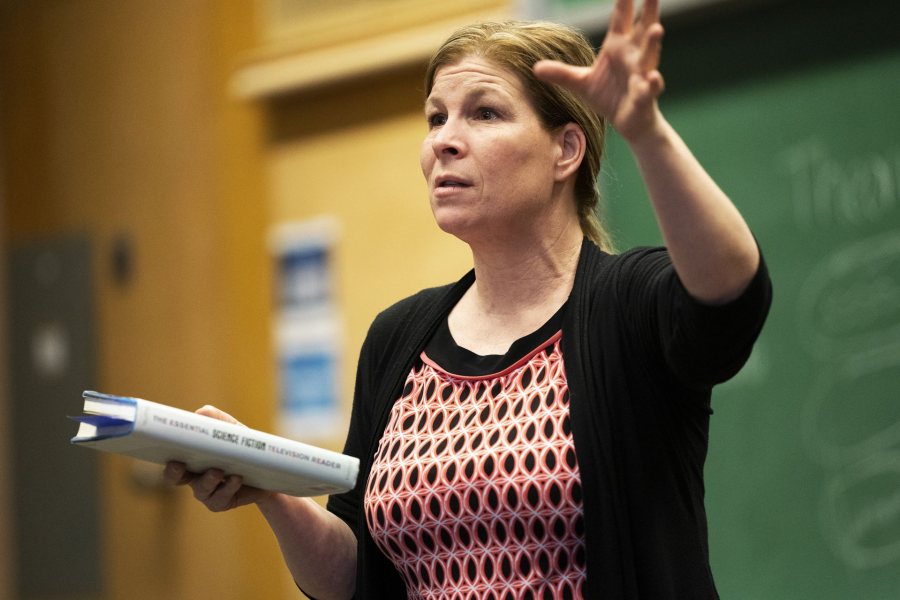
Stephanie Kelley-Romano leads a “Television Criticism” class on March 6, 2019. (Theophil Syslo/Bates College)
For example, debate moderators often framed discussions of universal healthcare as “taking away” private insurance in favor of government-funded care. It was only toward the end of these discussions that several candidates argued that universal healthcare would be a gain, not a loss.
“In the lead-up to 2020, Democrats must remember to take control of the framing of issues early, so they can focus on what it is they are trying to explain and why,” Kelley-Romano wrote.
Read the story:
- “If the Democrats master this single strategy, they can defeat Trump in 2020,” Newsweek, Aug. 1, 2019
Dan Mills
An Artist’s Maps of Imperialism and Greed — Hyperallergic
Carl Little reviewed in art news site Hyperallergic an exhibit at the Center for Maine Contemporary Art by Dan Mills, director of the Bates College Museum of Art.
Recently named by Maine magazine as one of 50 Mainers who are “creating a brighter future for the state,” Mills creates “collaged maps,” displays of numbers related to war and colonialism overlaid on vintage maps.
“Mills delves into the devastating numbers and then converts them into chaotically beautiful cartographies,” wrote Little, a well-known Maine art critic and historian. “The central paradox of his map pieces is that, even as they record the woes of the world, they are stunning and seductive. The visuals engage; the numbers appall.”
Read the story:
- “An Artist’s Maps of Imperialism and Greed,” Hyperallergic, Aug. 10, 2019
Rebecca Fraser-Thill
The five biggest myths about meaningful work — Forbes
Backed up by a recent study by Bates College and Gallup on purposeful work, Rebecca Fraser-Thill explained in Forbes that meaning in work and a meaningful life go hand in hand.
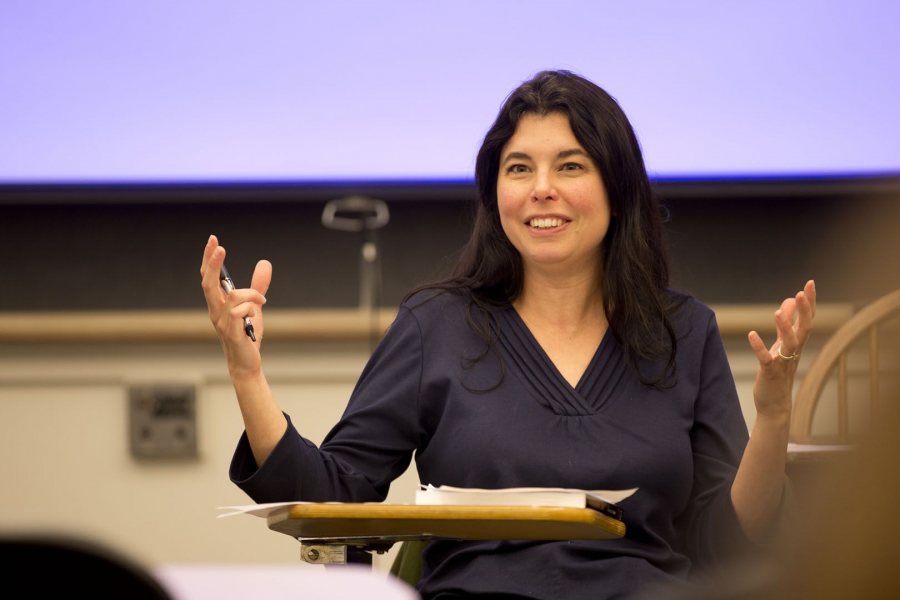
Rebecca Fraser-Thill is the director of faculty engagement and outreach at Bates’ Center for Purposeful Work and a lecturer in psychology. (Phyllis Graber Jensen/Bates College)
Dispelling several myths, Fraser-Thill, a visiting instructor of psychology and the director of faculty engagement and outreach at Bates’ Center for Purposeful Work, argued that meaningful work is subjective and individual — it does not have to be a helping profession, high status, low paying, or even different from what you’re doing now.
“Whether it’s simply asking a co-worker about her weekend or bringing a smile to customers in a coffee house, any act that makes us feel more connected to others also makes our work — and our lives — more meaningful,” she wrote.
Read the story:
- “The 5 Biggest Myths About Meaningful Work,” Forbes, Aug. 7, 2019
John A. Elsesser ’80
Conversation with: John Elsesser — Journal Inquirer
Tim Leininger of the Manchester, Conn., Journal Inquirer sat down with John A. Elsesser ’80, who has been the town manager of Coventry, Conn., for more than three decades.
Elsesser, who over 30 years has improved Coventry’s trash and sewer systems as well as its school and recreation programs, mused that he took to local government, in part, because of his upbringing, as the son of a Baptist minister.
“We always had company over,” he told Leininger. “We were taught that you should do good for others, try to make an impact. There was a lot of pressure for me to become a minister, me and my brother and sisters actually. None of us did, but I think the issue of trying to make a positive difference was the core of that.”
Read the story:
- “Conversation with: John Elsesser,” Journal Inquirer, Aug. 3, 2019
Sarah Strong
Across space and time: translating Night on the Galactic Railroad — Metropolis
Kenji Miyazawa’s masterpiece Night on the Galactic Railroad is exceedingly difficult to translate, wrote Eric Margolis of English-language Japanese magazine Metropolis. The novel, about a lonely Italian boy who rides to heaven on a magical train, contains surreal imagery and sound effects, made-up words, and regional dialect.
In taking on the task of translation in 1991, Sarah Strong, who is now professor emerita of Japanese language and literature, sought to represent in English the emotions of reading the novel in Japanese.
“If something was weird, I wanted the reader to think, ‘That’s weird,’” Strong told Margolis. “What was funny? What was happy? What was sad? I needed to get as close as I could to really understanding the writing.”
Read the story:
- “Across space and time: translating Night on the Galactic Railroad,” Metropolis, Aug. 2, 2019
Stephanie Wade and Megan Guynes ’11
River story workshop held in Lewiston — Sun Journal
In early August, Stephanie Wade, assistant director of Writing at Bates, ran a writing workshop at Tree Street Youth through the Androscoggin Land Trust.
Children at the youth center went fishing in the morning, then came back to write a story about their experiences, which Lewiston Sun Journal photographer Daryn Slover documented. Also on hand was Megan Guynes ’11, program director at Tree Street Youth.
See the photos:
- “River story workshop held in Lewiston,” Sun Journal, Aug. 1, 2019
Emily Kane
Winners overlook rigged games’ lack of fairness, study finds — Associated Press
For context on a Cornell study about winning and fairness, Associated Press reporter Seth Borenstein turned to Professor of Sociology Emily Kane.
In the study, nearly 1,000 people played a card came in which winners could throw out their worst cards and take other players’ best cards. The winners attributed their winning to talent and only acknowledged the unfairness of the game after they were allowed to exchange cards a second time.
The study “tells us something about privilege and about society,” Kane told Borenstein. “It reminds us how powerful perceptions are — it’s not just what is happening that matters, it’s often more a matter of what we think is happening,”
Read the story:
- “Winners overlook rigged games’ lack of fairness, study finds,” Associated Press, July 17, 2019
Mara Tieken
Despite West Virginia education reform, the extraction of rural youth to continue — The Register-Herald
Associate professor of education and rural education expert Mara Tieken spoke with reporter Erin Beck of West Virginia’s Register Herald about the state’s struggle to both promote college education and keep young people in the state.
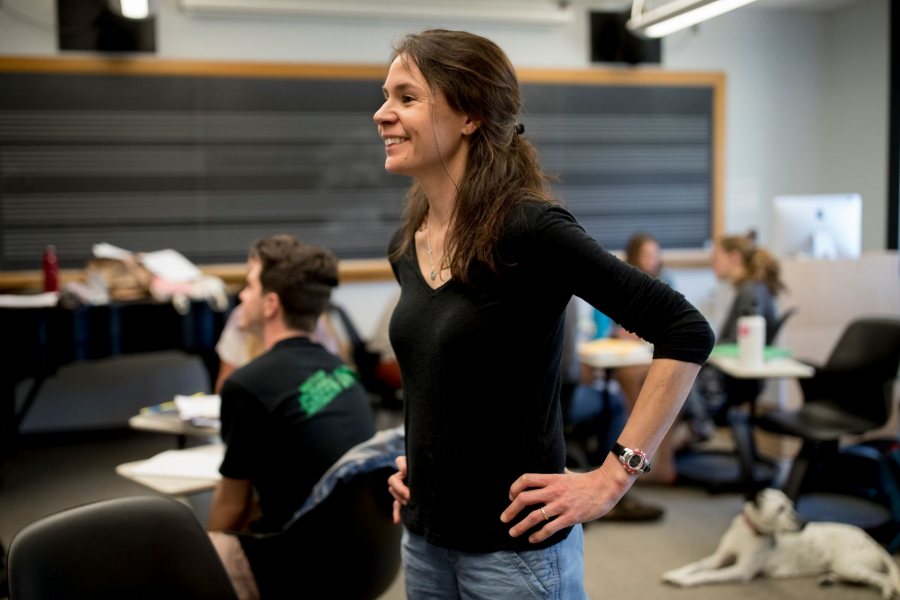
Associate Professor of Education Mara Tieken teaches “Community Organizing for Social Justice” in May 2018. (Phyllis Graber Jensen/Bates College)
Tieken said that few high school graduates in West Virginia are getting college degrees — there aren’t a lot of jobs in rural areas that require them, even as traditional jobs like coal mining are declining.
“If we’re really trying to support kids to go to college, we also need to make sure that there are jobs in rural places that can use that college education,” Tieken said.
Read the story:
- “Despite W.Va. education reform, the extraction of rural youth to continue,” The Register-Herald, Jul. 14, 2019
Karl Alexander ’12
Getting Bike Share Right Is a Balancing Act — U.S. 1
Karl Alexander ’12 spoke with Princeton, N.J., newspaper U.S. 1 about how bike-sharing companies can establish themselves responsibly in communities.
Alexander, marketing manager for Zagster, told reporter Diccon Hyatt that the bike-sharing company tries to move into places — like Princeton — that will already be receptive to more bicycles, and promote bike-friendliness from there.
“You have to take the time to look at what works best for the community, whether that’s bikes or scooters, or if it is something else entirely, like increasing walkability,” he said. “You have to think before you act. You’ll probably be better off in the long run.”
Read the story:
- “Getting Bike Share Right Is a Balancing Act,” U.S. 1, July 10, 2019
